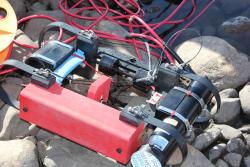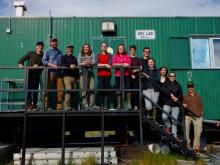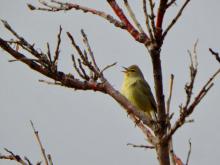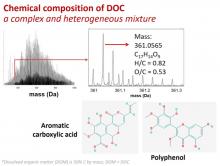Update
Now Archived! PolarConnect event with David Walker and researcher Rose Cory studying Carbon in the Arctic from Toolik Field Station in Alaska. This event was broadcast on Wednesday, 26 June 2019. You can access this and other events on the PolarConnect Archives site
What Are They Doing?

Where Are They?

Latest Journals

Dr. Rose Cory works in the Arctic where climate warming is thawing frozen soil which may release tremendous stores of dissolved organic carbon to the Earth's surface. After having been trapped for millennia in the frozen soils this new carbon then becomes part of the modern carbon cycle. Dr. Cory finds that exposure to sunlight accelerates the return of this dissolved organic carbon to the atmosphere as carbon dioxide, which may further increase the rate of global warming. Because climate change is influencing our planet's evolution, understanding the fate of newly released carbon will help predict our future as a planet and society. Read more about Dr. Cory and her research here

George W. Kling is a professor in the Department of Ecology and Evolutionary Biology at the University of Michigan. He primarily studies aquatic ecology and biogeochemistry, and his research has focused on carbon and nutrient cycling, on using stable isotopes to understand trophic interactions, and on the integration of lakes and streams in a landscape context. His recent research has examined the role of microbial diversity in ecosystem function. He has worked internationally on arctic lakes and streams for approximately 25 years, and on tropical lakes in Africa.
Kling's scientific outreach to the public through interviews about his research on climate change and on the killer lakes of Cameroon includes articles in magazines and newspapers (e.g., National Geographic, Smithsonian), T.V. and radio broadcasts (e.g., CNN, BBC), and television films (e.g., BBC, Discovery). He has met regularly with U.S. Congress members to discuss issues of climate change and scientific integrity, and was lead author of the Union of Concerned Scientists – Ecological Society of America publication 'Confronting Climate Change in the Great Lakes Region' (2003). Kling is an associate editor for Limnology and Oceanography (2001-), an elected Fellow of the American Association for the Advancement of Science (1997-), and received a National Academy of Science Young Investigator Award (1993), a NSF Presidential Faculty Fellowship (1995), the United Nations Sasakawa Award (Certificate for Disaster Reduction, 2001), and the ASLO Ruth Patrick Award (2007).

Dr. Byron Crump has worked in the Arctic for over a decade exploring the biodiversity and ecology of bacteria and other microbes in lakes, streams and soils. Microbial communities are essential components of every ecosystem on the planet, and in recent years we have learned that the most abundant organisms in natural microbial communities are unrelated to the cultured organisms studied in the lab for the last 100 years. Microbial communities contain an extremely deep diversity and an immense genomic potential of novel functional genes. Dr. Crump is currently conducting a multi-year study of microbial community composition and growth rate in arctic lakes and streams on the North Slope of Alaska to measure how diversity and growth vary over time and are affected by global change. You can read more about Dr. Crump's research here.






